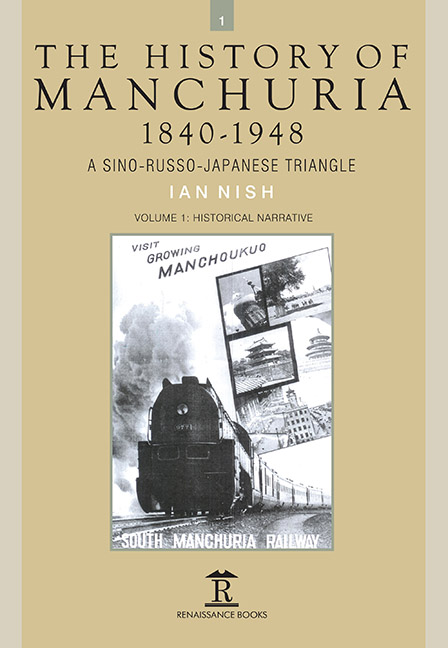Book contents
- Frontmatter
- Dedication
- Contents
- Preface
- Acknowledgements
- Name Conventions
- List of Abbreviations
- List of Maps
- Chapter One Manchuria and Russian Ambition, 1840s–1890s
- Chapter Two Sino-Japanese War and After, 1894–1900
- Chapter Three Prelude to the Russo-Japanese War, 1900–1905
- Chapter Four Railways, Reforms and Revolutions, 1906–1914
- Chapter Five Wartime Turmoil in Manchuria, 1915–1922
- Chapter Six Chang Tso-Lin’s Manchuria, 1922–28
- Chapter Seven Chinese Nationalism and Foreign Railways, 1929–1931
- Chapter Eight Lytton Commission in Manchuria, 1931–1932
- Chapter Nine Manchukuo: From Republic to Empire, 1933–1937
- Chapter Ten A Decade of Wars, 1938–1948
- Epilogue
- Map
- Select Bibliography
- Index
- Volume 2: Select Primary Sources
- Miscellaneous Frontmatter
- Dedication
- Miscellaneous Frontmatter
- Chapter 1 1840–1894
- Chapter 2 1895–1899
- Chapter 3 1900–1905
- Chapter 4 1905–1914
- Chapter 5 1915–1922
- Chapter 6 1922–1928
- Chapter 7 1929–1931
- Chapter 8 1931–1932
- Chapter 9 1933–1937
- Chapter 10 1938–1948
- Apendix Appeal by the Chinese Government
Chapter 10 - 1938–1948
Published online by Cambridge University Press: 18 November 2023
- Frontmatter
- Dedication
- Contents
- Preface
- Acknowledgements
- Name Conventions
- List of Abbreviations
- List of Maps
- Chapter One Manchuria and Russian Ambition, 1840s–1890s
- Chapter Two Sino-Japanese War and After, 1894–1900
- Chapter Three Prelude to the Russo-Japanese War, 1900–1905
- Chapter Four Railways, Reforms and Revolutions, 1906–1914
- Chapter Five Wartime Turmoil in Manchuria, 1915–1922
- Chapter Six Chang Tso-Lin’s Manchuria, 1922–28
- Chapter Seven Chinese Nationalism and Foreign Railways, 1929–1931
- Chapter Eight Lytton Commission in Manchuria, 1931–1932
- Chapter Nine Manchukuo: From Republic to Empire, 1933–1937
- Chapter Ten A Decade of Wars, 1938–1948
- Epilogue
- Map
- Select Bibliography
- Index
- Volume 2: Select Primary Sources
- Miscellaneous Frontmatter
- Dedication
- Miscellaneous Frontmatter
- Chapter 1 1840–1894
- Chapter 2 1895–1899
- Chapter 3 1900–1905
- Chapter 4 1905–1914
- Chapter 5 1915–1922
- Chapter 6 1922–1928
- Chapter 7 1929–1931
- Chapter 8 1931–1932
- Chapter 9 1933–1937
- Chapter 10 1938–1948
- Apendix Appeal by the Chinese Government
Summary
MY EXPERIENCE OF living in Manchukuo, as a British consular officer, was between December 1937 and June 1942. I took eight months leave in October 1938 and returned to Mukden (Shenyang) just before the outbreak of war with Germany. I was interned in the Consulate-General at Mukden from December 1941 until June 1942.
British consular representation in Manchuria was at the Consulates-General at Mukden and Harbin, while there was a Consulate at Dairen (Talien) in the Kwantung Leased Territory under Japanese administration. At Mukden the staff consisted of a Consul-General, two vice-Consuls (one from the China Service and one from the Japan Service), one British clerical officer, and Chinese and Japanese staff. The residence-cum-office was in the middle of a walled garden of about two acres. The Vice-Consuls lived in rented accommodation outside.
The British view was that Manchuria in the 1930’s was a part of China under Japanese occupation, specifically under the control of the Japanese Kwantung Army and the South Manchurian Railway. In accordance with the recommendation of the League of Nations, Britain had decided not to recognize the state of Manchuria. Since Britain held the Three Eastern Provinces to be part of China, she still claimed there the same extra-territorial rights to which she was entitled elsewhere in China. British subjects were not subject to local jurisdiction and cases could on this view be heard in consular Courts under the jurisdiction of the British High Court in Shanghai. Naturally the Manchukuo authorities and the Japanese contested these claims.
In effect, ‘Manchukuo’, though de jure part of China, was de facto a dependency of Japan. The practical result was that the British Consulates in Manchuria operated under two Embassies. Reports which were addressed to the Tokyo Embassy were copied to the Embassy in China and vice versa. By steering reports to the more sympathetic quarter, it was often possible for local British officials to obtain instructions along the lines that they hoped. They therefore enjoyed a good measure of autonomy. Major diplomatic representations were made in Tokyo with the Government of the occupying power.
- Type
- Chapter
- Information
- The History of Manchuria, 1840-1948A Sino-Russo-Japanese Triangle, pp. 126 - 134Publisher: Amsterdam University PressPrint publication year: 2016

